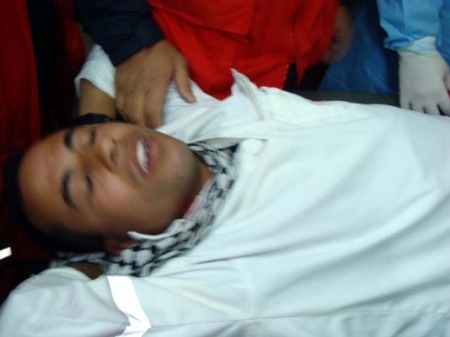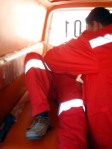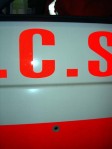Hassan al Attal: live ammunition injury, January 7

Hassan al Attal (35) has worked as a medic for 10 years in the Gaza Strip. While the nature of emergency rescuer work in Palestine is of constant exposure to the dangers of Israeli attacks –be it gunfire, shelling, illegal arrest or detention –and while Hassan had experienced these dangers, the last major Israeli attack on Gaza was by far the worst.
“I was wearing my uniform. I didn’t think that they would shoot me. I’ve worked for 10 years and have never seen anything like that.”
Hassan’s injury occurred when he was with a volunteer medic, Jamal Ibrahim Sayid (21), and a paramedic, Fayez el ‘Ajrami, at the northern Gaza Dawwar Zimmo crossroads. This area of eastern Jabaliya had been invaded and overtaken by Israeli soldiers and tanks when the land invasion began in the first week of the attacks.
Since the army had occupied Ezbet Abed Rabbo, the region east of the main north-south road Saleh el Din, injured and trapped residents had been calling the Red Crescent and other emergency services for evacuations of the wounded and the dead. In most cases, emergency rescuers were unable to reach these calls, hindered by Israeli army shooting and shelling.
Hassan, Jamal and Nahed el Showa were dispatched to Dawwar Zimmo on January 7th at 1:30pm, during the 1:00 pm to 4:00 pm “cease-fire” period announced by Israeli military. A martyred male Palestinian lay on Saleh el Din road; the Red Crescent had been called to retrieve the body.

The ambulance drove as close as possible to Saleh el Din road, stopping due to the risk of shooting by Israeli soldiers. Hassan and Jamal then continued by foot to the body. The pair, both in uniform and brightly visibly medical workers, had loaded the martyr onto a stretcher and, backs to unseen Israeli snipers, had begun carrying the martyr back towards the ambulance whose lights were flashing and siren on, indicating an emergency vehicle at work.
Hassan recalled: “A few seconds later, we came under heavy fire, around 20 shots. I was shot in the left thigh, and had to be helped by Jamal back to the ambulance”.
International observers in the ambulance saw it clearly: two well-marked, unarmed medical workers approached a corpse with the clear intention of removing it, all the while walking in a non-threatening manner and indicating their role as emergency workers.
Israeli sniping fire broke out and, impressively the emergency rescuers continued to carry the body, despite the obvious burden of the weight and risk to their own safety. It was only when the intense firing was so close to them, and Hassan had possibly been hit by this point, that they dropped the martyr and ran for their lives.
The two medics were able, after 15-20 seconds, to run back to the ambulance, after which point it became clear Hassan had been hit, shot in the right inner thigh. He was taken immediately to Al Awda hospital, then transferred to Al Quds hospital.
Since the Israeli attacks were on-going for the next 11 days, Hassan was unable to return to his Khan Younis home to recover, instead convalescing at an uncle’s home in the Gaza region. Yet after 2 weeks, Hassan was back at work, dedicated to his profession.

Hassan is a father of three: an 8 year old daughter, Annan, a 4 year old son Fawzi and a 1.5 year old son Ali.
Like all the medics during the Israeli attacks, Hassan took his work seriously and walked into the most dangerous regions when necessary, because people were calling for help. His case is notable not only for his injury, nor that he was clearly a paramedic, but also because Israel had noted the hours during which Hassan was shot as a ‘humanitarian cease-fire’ during which time it was supposed to be safe for civilians –let alone medics –to be on the streets.
Not only did Israeli soldiers again violate the 4th Geneva Convention, which guarantees the safety of medical and relief workers, but the Israeli soldiers violated their own military decree of a ceasefire.
However, due to the continued attacks on medical workers, in both Gaza and the occupied West Bank, it is understood that these were not isolated incidents, but part of a larger Israeli policy of denying access of emergency personnel to the wounded, a policy which goes years back.
In no other country would this be tolerated.






more information:
Leave a comment